The cold snap in March seems to have gone away, and the warmth of spring seems to be covering the campus. Most Kingos appear to be enjoying the warmth of the spring on their way to school. Even in this atmosphere, however, there are still Kingos who have difficulty taking classes and also have a hard time coming to school. They are the disabled students who are often unseen but surely exist among us. Therefore, the Sungkyun Times (SKT) will
discuss the difficulties that the disabled Kingos face at the school, what systems the school operates to guarantee disabled students’ educational rights and the possible ways to improve the school’s support for disabled students.
SKKU’s Disabled Students and the University’s Support
According to Sungkyunkwan University (SKKU)’s Support Center for Students with Disabilities, there are around 20~30 disabled students attending SKKU. Therefore, in order to secure their educational rights and access to the school, the university provides various support and puts effort to improve the members’ awareness of the disabled. The Support Center for Students with Disabilities, operating under the motto of “Building a Barrier-free Environment”, is in charge of providing such support.
One of the main areas of support that the support center is providing is the auxiliary device rental service. Disabled students can visit the support center and rent the devices available at the center whenever they need them. Moreover, the support center also provides a Class Helper System which is designed to help them concentrate better on their classes with the help of non-disabled students who take notes for them. The support center also produces and supports alternative forms of study materials, such as braille electronic books, scanned materials, and enlarged books so that the disabled students can study by themselves.
In addition, the Support Center supports issues that are not directly related to studying but are surely related to students’ educational rights. For example, the priority enrollment system allows disabled students who have difficulty enrolling in classes to enroll before non-disabled students. Disabled students can also ask the Support Center to change the location where their lectures are held. Finally, the Support Center also helps disabled students form a network of their own and participate actively in school life by holding orientations for freshmen with disabilities, opening counseling sessions, and providing employment assistance.
Difficulties That Kingos with Disabilities Face
Physical Barriers
1) Humanities and Social Sciences Campus
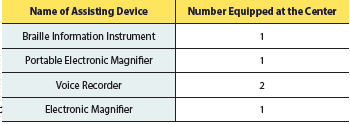
First of all, the Humanities and Social Sciences Campus, due to its steep hills, causes lots of physical difficulties and problems for Kingos with disabilities. For example, in terms of borrowing the auxiliary devices available, the Kingos must climb uphill and visit the Support Center located at the Central Library. This makes it more difficult for the disabled Kingos to borrow these devices when they need them. Also, for most types of devices, only one of each is available at the center. If one person is renting a device, it is more difficult for the other to use the same device.
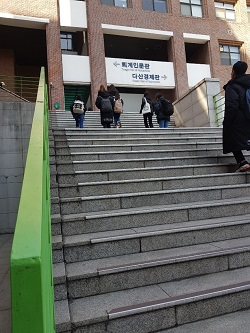
The steep hills not only cause disruptions in the use of auxiliary devices but also clearly restrict mobility within the school, including the lecture rooms. In particular, students who have to use wheelchairs must use their own cars to move around the school due to the steep hills. Nevertheless, there is not a single low-rise shuttle bus available at our school. Seong Na-yeong (Sophomore, Department of Politics and International Relations), the representative of the student club Equal, a club that promotes the disabled’s rights, said that the club once urged for the need for a lowfloor bus to the student council and the school, but the school refused their proposal saying that the school’s hills are too steep for a low-floor bus to come in. Moreover, Lee Ji-young (Junior, Department of Statistics) added that the school does provide services to improve the mobility rights for disabled students, such as changing the location of the lecture room for students with disabilities, but such measures are far from fundamental measures that truly make the campus barrier-free.
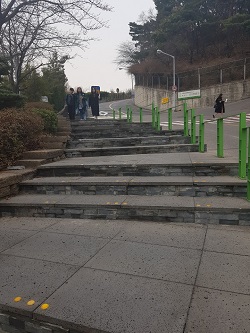
2) Natural Sciences Campus
The Natural Sciences Campus has relatively few mobility difficulties for disabled students compared to the Humanities and Social Sciences Campus because it has many recently built buildings and is a relatively flat campus. There still are, however, physical inconveniences for disabled students to attend school. Once in a while, when the Samsung Library’s first floor is closed, the only way to get to the basement reading room is to go down the stairs, which makes it impossible for students using wheelchairs to get in. In addition, there are some parts of the roads where there are no braille sidewalks. Lastly, some of the wheelchair ramps are so steep that it even seems dangerous to use with wheelchairs.
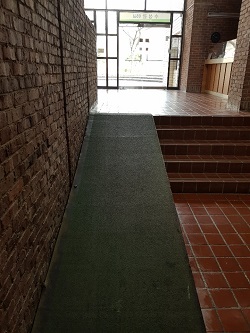
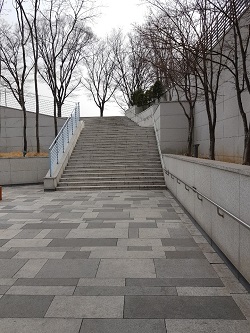
Problems of the Support Systems
While the current disabled student support system is not sufficient, it is still focused on providing physical support. Beyond physical support, disabled students are in need of support that fits the degree of their disability. SKKU, however, mainly provides generalized support that does not take into account the degree and type of disability. Although there are class helpers who may be aware of each individual’s disability, it is likely that these helpers face lots of difficulties due to their lack of knowledge about caring for the disabled. There are a variety of unexpected situations that can occur depending on the type and degree of disability, but it is not easy for students to find out about them.
The departmental structure also makes it hard for disabled students to be provided with immediate assistance when they need help. As mentioned earlier, the Support Center is located at the Central Library and Samsung Library on each campus, but disabled students are exposed to situations in which they need immediate help rather than situations in which they find help by visiting the Support Center by themselves. Also, there is only one social worker dedicated to supporting the disabled at both the Humanities and Social Sciences Campus and Natural Sciences Campus, which is also a hindrance to providing immediate help.
Lack of School’s Awareness
Furthermore, there is a lack of awareness about disabled students’ treatment among the members of the university as a whole. In fact, there are only a few pledges for disabled students made by the student council. Particularly in recent years, not a single pledge has been made as the campaigns’ main pledge. Thus, there is considerable room for the needs of disabled students that are not properly conveyed to the school and the student body. Although there is Equal that can deliver the needs of disabled Kingos, it is not as effective as delivering a message to the school by an official student council. Lee Ji-young of Equal said, “Even if Equal conveys the opinions of disabled students, it is hard to implement specific measures at the club level. Although the opinion is conveyed by the Support Center, it is inevitable that there will be limitations in influencing the school’s decision when considering the small size of the department.”
Possible Ways to Improve the School Environment for Disabled Kingos
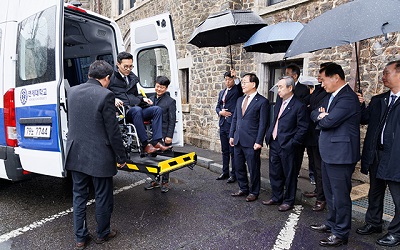
Lowering the Physical Barriers
Currently, Kingos with disabilities can possibly have trouble going to the Support Center and borrow the devices they need. Thus, it is necessary to first get enough of these devices and allocate them to each building’s administrative office, so that the students face less difficulty renting the devices. If it is not possible to keep all the devices in each building, devices that are more frequently used can first be allocated at least to secure the Kingos’ educational rights. In addition, if adopting low-rise shuttle buses is not possible, the school may consider alternatives such as wheelchair lift vehicles. Seoul National University (SNU) and Yonsei University have already adopted the wheelchair lift vehicles and have been operating the vehicles to secure the students’ mobility and education rights. In particular, if wheelchair lift vehicles are operated at SKKU, disabled Kingos will benefit hugely from them which run at short intervals between the International Hall and the Suseon Hall on the Humanities and Social Sciences Campus.
Improving the Support System
Lowering the physical barriers that disabled Kingos face would probably be a substantial improvement for the disabled Kingos’ educational rights, but a systematic change should follow to truly improve the educational rights of Kingos.
1) A Change Needed in the Class Helper System
The class helpers are changed every semester and this makes it difficult for disabled students to get the right help they need. Moreover, a single semester is not enough time for the class helpers themselves to get used to helping out the students they are supporting. Therefore, enough education regarding the helpers’ work should be provided. To further improve the system, there seems to be a need to employ helpers that can work for several semesters so that the helpers offer better support as they become more experienced.
2) Cooperation Among the Members of the School
As mentioned above, there is only one worker who is in charge of giving expert support for disabled Kingos’ welfare. This means that only one worker throughout the two campuses has the expertise to give the right support for disabled Kingos at SKKU. Thus, to solve the problem of a lack of human resources, the school may cooperate with the experts within SKKU, such as professors and graduate students in the Department of Social Welfare. Moreover, although the main tasks regarding the disabled Kingos’ welfare can be carried out at the Disabled Student Support Center, it is necessary to have a person in charge at each of the university’s offices. For example, Korea University (KU) has a person in charge at each of the building’s administrative offices who helps resolve the daily problems that disabled students may face.
3) Additional Education for the Instructors
Additional education regarding the disabled students should be provided to instructors. The school does provide them with additional information on the disabled students who attend their classes prior to the beginning of the semester, but this is very unlikely to be considered “enough”. Although additional information about the student is provided beforehand, how much the instructors take care of the student is a completely different story. Thus, the school should give additional education about teaching disabled students and provide guidelines that could help the instructors educating these students. Seong Na-yeong from Equal said, “Although I am not completely blind, I do have difficulty seeing the instructors’ slides on the projector screen. This is not a problem in most cases because most instructors tend to upload their slides online, but this becomes a problem for me when the instructor does not post their slides on i-Campus.” To avoid such circumstances, it is necessary for the school to give the instructors the guidelines and education that can be helpful in guiding the disabled students taking their lectures.
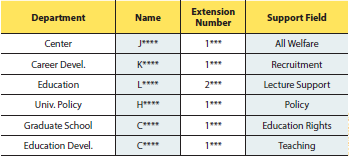
4) Organizing Communication Channels
Last, and most importantly, non-disabled Kingos themselves need to form the means to listen to the opinions of the disabled Kingos. Kingos with disabilities are considered to be minorities within the university community. To listen to their voices and reflect their opinions, the school should provide students with disabilities with an official communication route or organization that could help them implement their needs. It is also necessary to periodically launch campaigns to improve the awareness of disabled students and provide institutional devices for disabled students by investigating the needs of disabled students on the student council level. An appropriate example would be the 49th student council Sungkeum’s installation of a wheelchair ramp at the Student Center of the Humanities and Social Sciences Campus after receiving feedback from Equal on improving mobility rights for the disabled.
The school provides lots of support to guarantee the rights of the Kingos who have disabilities. Considering the level of support from the school, however, the disabled students still seem to face lots of barriers on the campus. To become a barrier-free school, the SKKU and the school members have a lot of problem-solving to do beforehand. The SKT hopes that SKKU can become a truly barrier-free school that guarantees the educational rights of “all”, not just most, Kingos.
